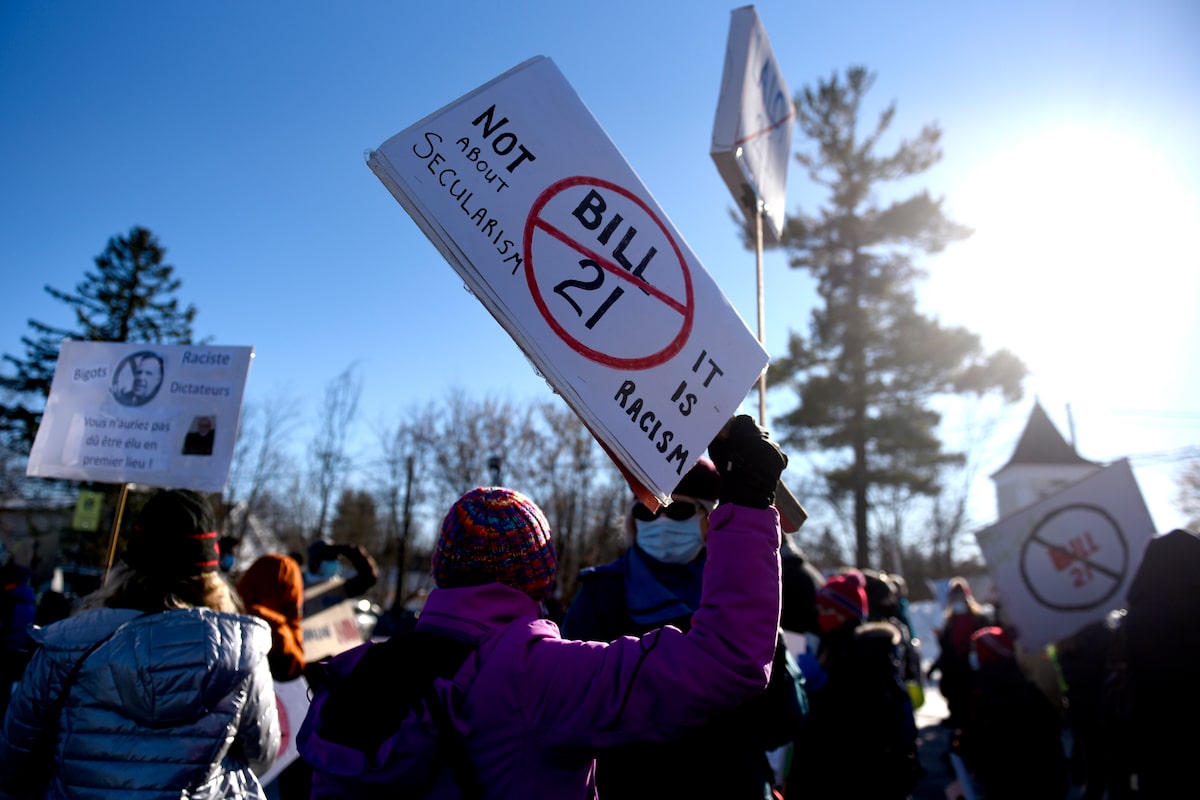People rally against Quebec’s Bill 21, which prohibits some public sector workers from wearing religious symbols at work in Chelsea, Que., in Decemeber, 2021. Quebec’s government has used the notwithstanding clause to shield its legislation from court challenges.Justin Tang/The Canadian Press
Ottawa is defending its proposal at the Supreme Court of Canada to put limits on governments’ use of the notwithstanding clause, with the federal Liberals arguing they are standing up for the Charter of Rights and Freedoms.
In the House of Commons on Thursday, Minister of Canadian Identity Steven Guilbeault said, “We have the responsibility to defend one of the pillars of our democracy, the Charter.”
Ottawa staked out its arguments in a legal filing to the Supreme Court on Wednesday in the landmark case over Quebec’s secularism law. These would be the first substantive limits on governments’ use of the notwithstanding clause to override the rights of Canadians, should the Supreme Court endorse the ideas.
The Liberals proposed that courts should be able to declare rights have been violated even if the notwithstanding clause means a law cannot be struck down. More controversially, they also proposed judicial review of longer-term use of the clause, arguing that prolonged use that prevents people from exercising rights is equivalent to denying those rights.
The proposals immediately sparked an expected clash between the Liberals and some provinces, led by Quebec, and other political opponents.
Ottawa calls on Supreme Court to clarify the law around use of Charter’s notwithstanding clause
The Supreme Court, for the first time in almost four decades, will adjudicate details of the notwithstanding clause in a case on Quebec’s Bill 21, the province’s secularism law. In 2019, and again last year, Quebec used the clause to shield its legislation from court challenges. The law bars public-sector workers, including police and teachers, from wearing religious symbols such as crosses and hijabs on the job.
In a rare step after a legal filing to the Supreme Court, Justice Minister Sean Fraser released a statement Thursday saying the federal Liberals were responding to the major stakes in the Bill 21 case: “The Supreme Court’s decision will shape how both federal and provincial governments may use the notwithstanding clause for years to come.”
The text of Section 33 of the Charter, the notwithstanding clause, does not indicate limits on its use beyond having to renew it every five years, and a 1988 Supreme Court precedent supported governments’ generally unfettered use of the clause.
Ottawa didn’t specifically oppose Bill 21 at the Supreme Court, but a limit on consecutive uses of the notwithstanding clause takes aim at Quebec.
Ottawa, provinces set to file arguments in landmark Supreme Court case over Quebec’s secularism law
Quebec Immigration Minister Jean-François Roberge told reporters at the National Assembly in Quebec City on Thursday that the federal government is seeking to invalidate Bill 21 at the Supreme Court.
“Everyone sees what they’re trying to do, and I think this is not acceptable,” Mr. Roberge said.
In Ottawa, during Question Period in the House of Commons, the Bloc Québécois called the Liberals’ proposals an attack on Quebec and a constitutional power grab.
The Opposition Conservatives did not broach the issue. Leader Pierre Poilievre has long said that if he became prime minister, he would be the first to use the notwithstanding clause.
The lower courts in Quebec twice upheld Bill 21, and the Supreme Court agreed to hear the case in January. Most of the legal arguments have now been filed. A hearing has not yet been scheduled.
Should the Supreme Court accept Ottawa’s position in an eventual ruling on Bill 21 – and such an outcome remains speculative – it would mark a major constitutional change.
Pressure builds for in-person intervenors at Supreme Court Quebec secularism law hearing
“It would be a fundamental shift in terms of what Section 33 was meant to be and to achieve,” said Bronwyn Eyre, formerly Saskatchewan’s justice minister from 2022 to 2024 and now a senior fellow at the Montreal Economic Institute.
Saskatchewan filed its Bill 21 arguments on Wednesday and, along with Alberta and Ontario, supported Quebec as the conservative-led provinces fully opposed any restrictions on the notwithstanding clause.
Some experts felt Ottawa didn’t go far enough. The federal Liberals had previously opposed pre-emptive use of the notwithstanding clause, which is what Quebec did in 2019 with Bill 21. The Liberals avoided this issue in their filing to the top court on Wednesday.
“This is politically unsurprising but ultimately disappointing,” said Lawrence David, counsel for the Public Interest Litigation Institute, an intervenor in Bill 21 that wants the Supreme Court to bar pre-emptive use of the clause.
Mr. David suggested the Liberals chose a more cautious legal position in part because of their minority-government status.
Several prominent conservatives on Thursday said there will be a constitutional crisis if the Supreme Court imposes limits on the notwithstanding clause, including Ben Woodfinden, spokesman for Mr. Poilievre from 2022 until this past spring, and Howard Anglin, a top adviser in the 2010s to former prime minister Stephen Harper.
“This is outrageous,” Mr. Woodfinden said of the Liberals’ proposal in a social-media post.

